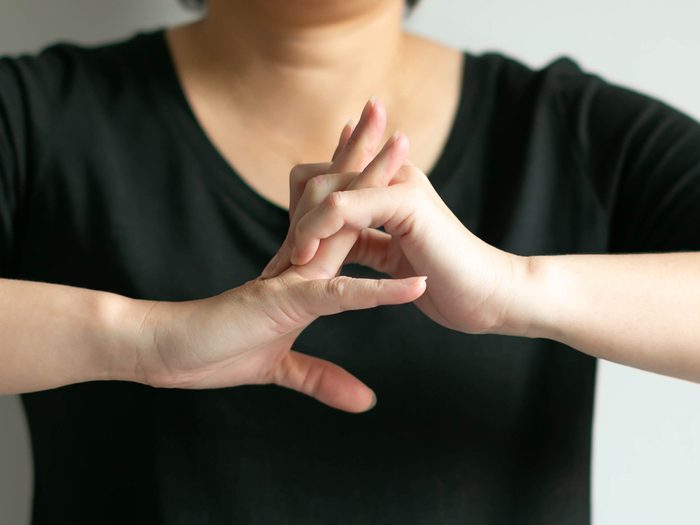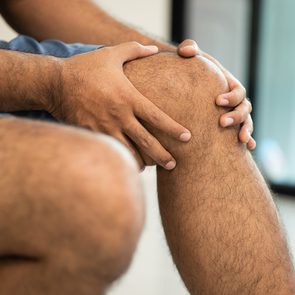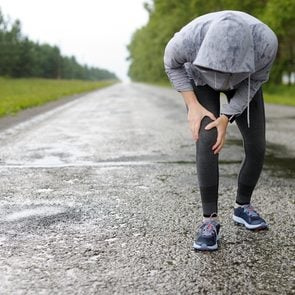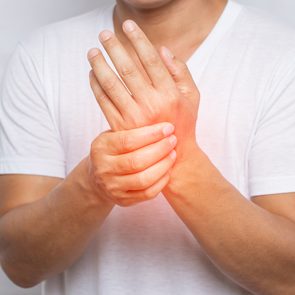Is Cracking Your Knuckles Bad for You?

Mom always warned it would lead to arthritis, but is there any research to back up that claim? Our medical experts weigh in.
Snap. Crackle. Pop.
No, it’s not the cereal—it’s tribonucleation, the technical term for cracking your knuckles. Whether done out of habit, stress or just because it feels good, you’ve likely been warned by someone who means well (or has just had enough of the sound) that it will give you arthritis.
But their warning doesn’t have much merit, according to most medical professionals.
One doctor was so eager to prove his nagging family wrong that he cracked the knuckles in his left hand at least 36,500 times (by his count) for over 50 years while leaving his right hand untouched. Dr. Donald Unger, an allergist, did this in the name of science, though he seems to have been at least as motivated by an eventual “I told you so.” Publishing his findings in a letter to the scientific journal Arthritis & Rheumatology in 2004, he said that “There was no arthritis in either hand, and no apparent differences between the two hands.”
His findings are, of course, anecdotal, although often cited by professionals in the field. But do they mean that there are no side effects to cracking your knuckles (or other parts of your body for that matter)?
Is cracking your knuckles bad for you?
“As best we understand, it seems to be neutral,” says Dr. Erin Brown, a clinical professor at the University of British Columbia and medical director of plastic surgery at Vancouver General Hospital. “There’s not a lot of research about this,” he adds, but “other studies have not found that it’s associated with arthritis.”
Despite this, the popping noise can be disconcerting-slash-annoying for some. What is the sound we hear when someone cracks a knuckle or other joint? It has to do with gas bubbles that form in the synovial fluid, which lubricates your joints, when two solid surfaces (i.e. your bones) move apart temporarily, creating a sort of suction.
There’s been some debate over the years over whether the sound happens when that gas bubble bursts or when it’s formed. Recent studies using MRIs show that these little gas bubbles persist even after the “pop” has been heard, suggesting that it’s the creation of the bubbles that makes the noise.
And if you’re one of the people irritated by the sound, that could be because mathematicians have found that the sound produced by cracking your knuckles can reach up to 83 decibels, which is louder than the average radio and similar to city traffic from inside a car.
Whether you love it or hate it, up to 45 percent of you do it, and many describe a feeling of relief from doing so. Some of that could be because after a joint is cracked, there’s a slightly increased range of motion, so you feel more flexible.
Of course, there are some things to watch—er, listen—out for.
Should I be worried about hearing other bones crack?
“As you get older, a lot of us have knees that creak or something. You’re sitting down and you get up and you can hear them snapping and cracking. That’s a different thing,” says Dr. Brown. “That is the bones actually rubbing against each other, and that can be a sign of wear and tear.”
He also mentions that while he’s never seen it, there have been odd cases where someone can dislocate a joint when it pops out of place. But when it comes to basic knuckle cracking, Dr. Brown assures us that if it feels okay, we’re free to keep doing it.
Still, if you’re cracking any part of your body, heed the doctor’s orders—if it “doesn’t feel right, then it’s probably worth having assessed because it could be something else.”
Next, find out if cherry juice really provides relief for arthritis pain.






